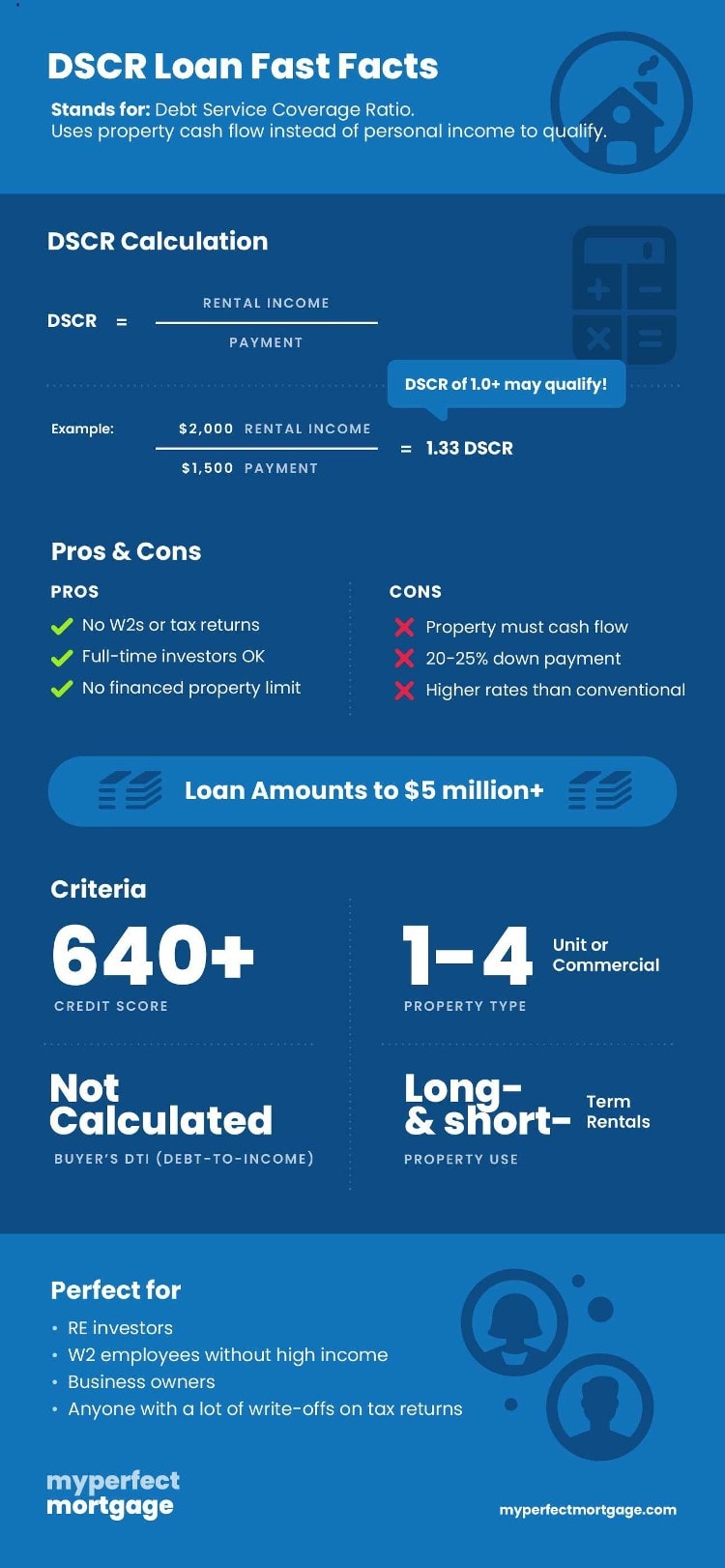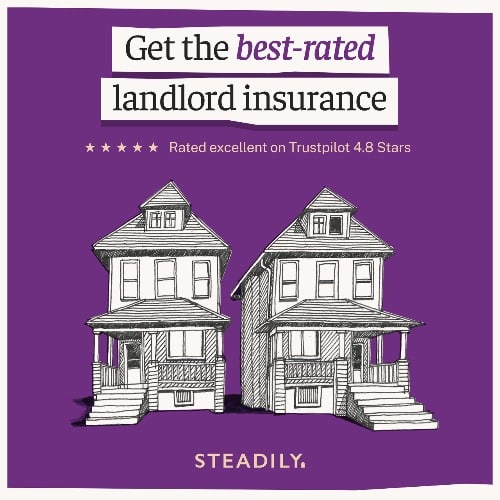- Top-rated landlord insurance
- Get a quote in minutes
- Protect your rentals
- Most competitive rates in the U.S.
- *We may be compensated if you purchase through this link
Landlords who want to grow their real estate portfolios are discovering a powerful new tool: DSCR loans.
Investors can qualify for a Debt Service Coverage Ratio (DSCR) loan with income they will receive from the rental home they’re buying. Traditional lending relies on past personal income documents to underwrite the loan.
DSCR loan lenders won’t ask for personal income tax forms because they expect the property itself to generate enough income to make the mortgage payments.
Submit your DSCR loan scenario.What’s in this article?
Best DSCR loans for real estate investors
Businesses and corporations have measured debt-service coverage ratios, or DSCRs, for decades. Now, more and more individual real estate investors are using this concept to underwrite home purchase loans.
The logic of DSCR loans is simple: If the new property will earn enough monthly rent to cover its monthly mortgage payment, the rent will cover the debt. The borrower’s personal income can be excluded from the lending process.
This ratio between rent and debt is the foundation for all DSCR loans, but as this segment grows, borrowers can find DSCR loans with more variations. Some DSCR loans will work better than others depending on each investor’s unique situation.
The best DSCR loans for real estate investors include:
Fixed-rate DSCR loans
This is the standard real estate DSCR loan. Borrowers get a fixed interest rate and fixed monthly payments, often over a 30-year term, just like they would if buying a primary residence. These loans normally require at least 20% to 25% down.
If the monthly payment on the rental equals the monthly rent on the home, the property’s DSCR is 1.0. If rent exceeds the monthly payment, the DSCR is higher than 1.0, and the loan looks more stable to the lender.
Most DSCR lenders want to see ratios of 1.25, which would mean the property’s rent exceeds its debt payment by 25%.
But some lenders, such as Griffin Funding, will allow DSCRs below 1.0 if the borrower has enough cash reserves to cover the mortgage debt for a year while also making a down payment of 25% to 35%.
Get started on your fixed rate DSCR loan.Adjustable-rate DSCR loans
Adjustable rate DSCR loans, or DSCR ARMs, offer a fixed interest rate at first. The fixed rate normally lasts five or six years. After the fixed rate period expires, the loan’s rate and payment can change each year based on market conditions.
Why would anyone want an adjustable rate? Sometimes, an ARM can help investors qualify for DSCR financing. DSCR ARMs usually offer a lower rate during the initial period — when compared to a fixed rate on the same property.
Lower rates mean lower payments, and lower payments raise the loan’s DSCR, making the loan look more stable to the lender.
For example, a fixed-rate loan’s DSCR might be 1.2 while the same loan with an adjustable rate might be 1.3. For some lenders, this 0.1 increase could be the difference between approval and denial.
Investors who choose DSCR ARMs often have plans to pay them off or refinance them before the low intro rate period expires.
Interest-only DSCR loans
Some DSCR loan lenders allow interest-only payments on the mortgage during the first three to five years of the loan’s term. Interest-only payments will be lower than principal-and-interest payments, and lower payments raise the property’s DSCR.
At some point, normally after three to five years, the interest-only period expires. The borrower starts making principal and interest payments for the rest of the term.
Interest-only DSCR loans offer a way to buy a valuable piece of rental property without having to amortize the full loan amount right away. JMAC Lending offers this option with as little as 25% down.
By the time the loan’s principal and interest payments kick in, an investor may have another financing plan — or rent may have increased, raising the DSCR along with it.
40-year with 10-year interest-only period
A 40-year interest-only DSCR combines the interest-only approach with a longer loan term, lowering payments and raising coverage ratios.
Instead of lasting only three to five years, the interest-only period could last up to 10 years. After 10 years of paying only interest, the loan fully amortizes as a 30-year fixed-rate loan.
Investors have 10 years to prepare for the higher mortgage payments that will kick in once the interest-only period expires.
NewFi Lending and Angel Oak Mortgage Solutions offer 40-year loans with 10-year interest-only payment periods.
The upside: The loan’s lower payments can help qualify with a higher DSCR. The downside: If you stick with the loan for the full 40 years, you’ll pay more in long-term interest.
Open up opportunities with the 40-year IO program.Jumbo DSCR loans
Unlike with primary residence loans, there’s no official maximum DSCR loan size. But many lenders cap DSCR loans at $1 million or $2 million.
In most markets, these caps leave plenty of room to buy a home at median prices, but they typically aren’t large enough to buy a multi-unit property.
To buy a more expensive property, investors may need a Jumbo DSCR loan. Several DSCR lenders offer larger loan sizes. Coast2Coast Mortgage’s DSCR program offers up to $5 million with 20% down. JMAC Lending will underwrite up to $3.5 million.
These bigger loans may have stricter rules for qualifying, such as showing more cash reserves. Borrower credit scores matter, too. Instead of the standard 620 FICO score, some lenders want to see scores of 660 to 680 on jumbo loans.


- Top-rated landlord insurance
- Get a quote in minutes
- Protect your rentals
- Most competitive rates in the U.S.
- *We may be compensated if you purchase through this link
Past-credit-event loan
Recent bankruptcies or foreclosures in an investor’s credit file will usually scare traditional lenders which limits loan options for these borrowers.
Some DSCR lenders are more lenient about past credit events because they’re expecting the property itself to generate enough rent to cover the debt. They’re not relying as heavily on the borrower’s credentials.
Griffin Funding can help investors with a shaky credit history get approved based on their property’s DSCR.
Less-than-perfect credit? It’s still worthy applying.Non-warrantable condo loan
Non-warrantable condos will not qualify for government-backed or conventional mortgage financing.
But since DSCR loans are non-QM loans — meaning they aren’t federally insured or aligned with Freddie Mac and Fannie Mae’s rules — they can be used to buy a non-warrantable condo.
This doesn’t mean a homeowner could use a DSCR loan to finance a non-warrantable condo for use as a primary residence; DSCR loans finance only rental properties.
But it does mean real estate investors aren’t limited to buying warrantable condos (ones that meet Fannie Mae standards) with DSCR loans.
Since the lender takes risks with these kinds of loans, it may have its own approval criteria for properties. For example, a lender may deny a loan if there’s a pending lawsuit against the development.
Commercial
More and more individual investors are discovering DSCR loans to buy single-family rental units. But DSCR loans can work for commercial properties, too.
DSCR loans could finance 5+ unit apartment complexes, hotels, or even assisted living communities. These types of loans can be closed in the name of an LLC instead of an individual investor.
Commercial property loans will likely need higher cash reserves and a higher debt-service coverage ratio.

DSCR loan alternatives
DSCR loans eliminate the need to share personal income information with the lender. That’s one of their biggest draws, especially for investors who might have to share dozens of pages of sensitive data to document their income.
But there are other low- and no-documentation loans that can help investors expand their real estate portfolios. If DSCR isn’t quite right for you, consider one of these options instead:
- Bank statement loans: Lenders can confirm an investor’s cash flow by looking at 12-24 months’ bank statements instead of tax forms. Investors who write off a lot of business expenses may qualify for larger loans with bank statements.
- ITIN loans: Non-U.S. citizens, or anyone who doesn’t have a Social Security number, can use their Individual Tax Identification Number (ITIN) to prove their income.
- HELOC: Coming up with the cash for a DSCR loan down payment can be tough for new investors. A HELOC can leverage equity from a different home, including a primary residence, to generate the down payment.

- Approval in 5 minutes. Funding in as few as 5 days
- Borrow $20K-$400K
- Consolidate debt or finance home projects
- 640+ credit
- 85% max loan-to-value (LTV)
- *We may be compensated if you use this partner’s services through this link
- Stated income loans: It may still be possible to find a non-QM lender offering stated income loans. These can require no documentation but will charge higher rates and require higher minimum credit scores than other loan options.
- Hard money: Private investors fund hard money loans which can help real estate investors who need fast access to short-term financing.
These kinds of loans won’t be governed by the Consumer Financial Protection Bureau so borrowers should always read the terms carefully before applying.
Best DSCR loans FAQ
Many lenders offer great options, such as fixed-rate, adjustable rate, jumbo, and 40-year with 10-year interest-only. The best loan and lender for you depend on your goals and scenario. Learn about loan options here.
To qualify for a DSCR loan, find a property that brings in at least 25% more income than its full PITIA payment. Then, meet other guidelines like credit score and down payment requirements.
It’s a good idea to call around to a few lenders. There are no standard DSCR guidelines, so one lender may offer a better rate, lower down payment, or more flexible terms. Get a second opinion from a DSCR lender here.
The best DSCR loan matches the investor’s unique needs
The flexibility of DSCR financing can help new and experienced real estate investors earn more money as landlords.
As lenders continue to adapt this underwriting concept, creating more DSCR loan variations, these loans will meet even more investors’ needs.
Of all the current and future loan choices, the best DSCR loan is the one that opens the most doors while creating the least amount of risk possible for the investor.
Submit your DSCR loan scenario.
- Top-rated landlord insurance
- Get a quote in minutes
- Protect your rentals
- Most competitive rates in the U.S.
- *We may be compensated if you purchase through this link

- Top-rated landlord insurance
- Get a quote in minutes
- Protect your rentals
- Most competitive rates in the U.S.
- *We may be compensated if you purchase through this link
Our advise is based on experience in the mortgage industry and we are dedicated to helping you achieve your goal of owning a home. We may receive compensation from partner banks when you view mortgage rates listed on our website.






